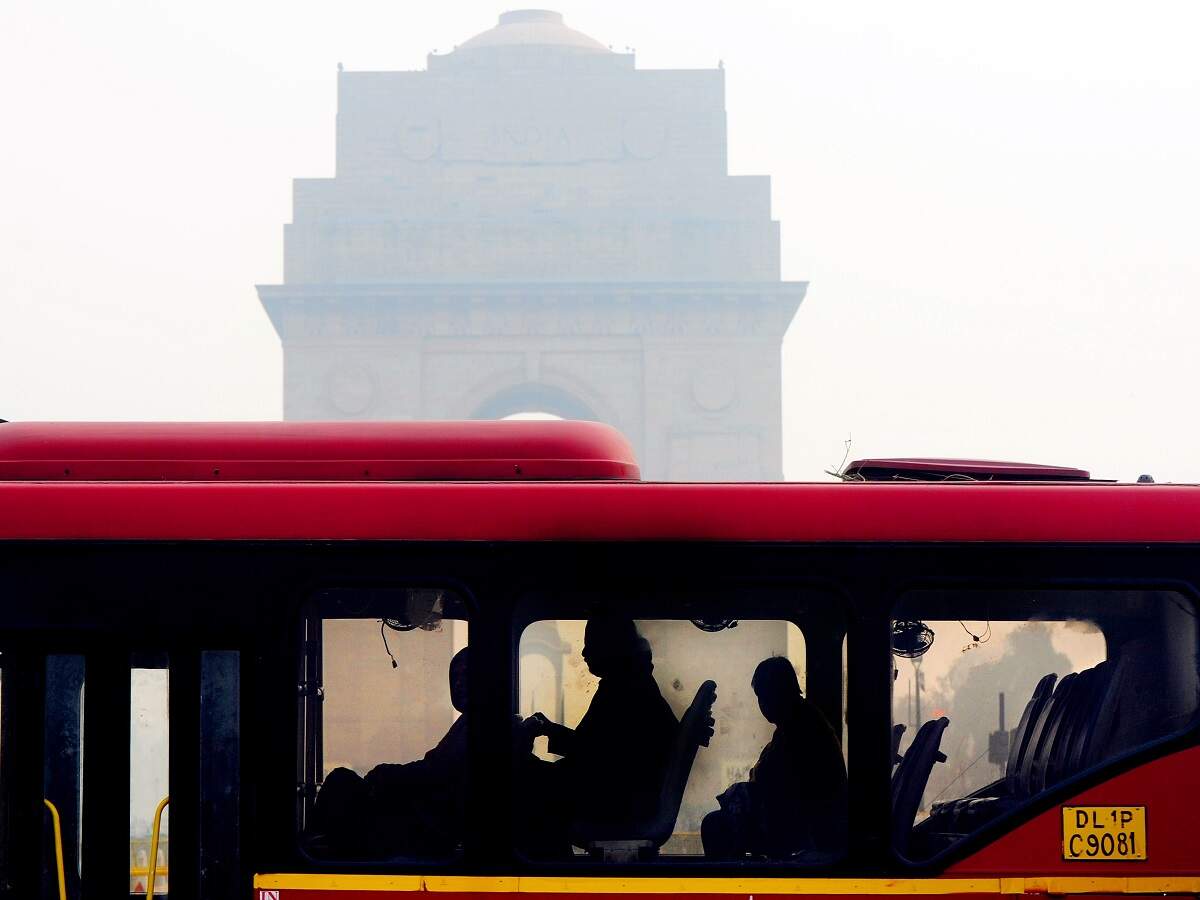Stubble burning contributed the least to Delhi pollution
PTI | Updated: Nov 14, 2018, 20:51 ISTHighlights
- Air quality has "improved significantly mainly due to sufficient rainfall last night that washed away bigger particles
- The rainfall created space for faster dispersion without a decline in temperature.
- AQI is back to 'very poor'. A slight increase in 'AQI' is predicted in next three days but it is likely to remain in very poor category.
 Cloudy weather in Delhi on Wednesday.
Cloudy weather in Delhi on Wednesday.NEW DELHI: Delhi's air quality "improved significantly" on Wednesday as overnight rains washed away bigger pollutants and stubble burning in neighbouring states declined, contributing just three per cent - the lowest this month- to pollution.
Track the pollution level live in your city
Though the conditions provided some respite to the city which has been reeling under "severe" pollution for the past one week, the air quality was still far from safe and fell in the 'very poor' category with AQI of 306.
The AQI has been oscillating between severe and the upper range of very poor for the past one week even crossing 600 post-Diwali.
According to the Centre-run System of Air Quality and Weather Forecasting (SAFAR), the contribution of stubble burning to the pollution in Delhi has been recorded the least on Wednesday for this month at 3 per cent. On November 5, the contribution of stubble burning was the highest this month at 33 per cent.
On Wednesday, the PM2.5 -- particles in the air with a diameter of less than 2.5 micrometres - level was recorded at 175, while the PM10 - particles in the air with a diameter of less than 10 micrometres - was recorded at 280 in Delhi, according to the data by the Central Pollution Control Board.
Twenty one areas in Delhi recorded 'very poor' air quality while 14 areas showed 'poor' air quality, the CPCB said.
Similar conditions are likely to prevail in the coming days, according to SAFAR.
Ghaziabad, Faridabad, Greater Noida and Noida recorded 'very poor' air quality while Gurgaon's air quality was recorded in the 'poor' category, it said.
An AQI between 0 and 50 is considered 'good', 51 and 100 'satisfactory', 101 and 200 'moderate', 201 and 300 'poor', 301 and 400 'very poor', and 401 and 500 'severe'.
SAFAR said air quality has "improved significantly mainly due to sufficient rainfall last night that washed away bigger particles and created space for faster dispersion without a decline in temperature".
"AQI is back to 'very poor'. A slight increase in 'AQI' is predicted in next three days but it is likely to remain in very poor category," SAFAR said.
This is mainly due to the fact that surface winds are still low and the temperature is likely to cool down, it said.
"Stubble fire is unlikely to impact Delhi air quality index (AQI) as fire counts are significantly down and winds are also flowing from other direction," SAFAR said in a report.
Track the pollution level live in your city
Though the conditions provided some respite to the city which has been reeling under "severe" pollution for the past one week, the air quality was still far from safe and fell in the 'very poor' category with AQI of 306.
The AQI has been oscillating between severe and the upper range of very poor for the past one week even crossing 600 post-Diwali.
According to the Centre-run System of Air Quality and Weather Forecasting (SAFAR), the contribution of stubble burning to the pollution in Delhi has been recorded the least on Wednesday for this month at 3 per cent. On November 5, the contribution of stubble burning was the highest this month at 33 per cent.
On Wednesday, the PM2.5 -- particles in the air with a diameter of less than 2.5 micrometres - level was recorded at 175, while the PM10 - particles in the air with a diameter of less than 10 micrometres - was recorded at 280 in Delhi, according to the data by the Central Pollution Control Board.
Twenty one areas in Delhi recorded 'very poor' air quality while 14 areas showed 'poor' air quality, the CPCB said.
Similar conditions are likely to prevail in the coming days, according to SAFAR.
Ghaziabad, Faridabad, Greater Noida and Noida recorded 'very poor' air quality while Gurgaon's air quality was recorded in the 'poor' category, it said.
An AQI between 0 and 50 is considered 'good', 51 and 100 'satisfactory', 101 and 200 'moderate', 201 and 300 'poor', 301 and 400 'very poor', and 401 and 500 'severe'.
SAFAR said air quality has "improved significantly mainly due to sufficient rainfall last night that washed away bigger particles and created space for faster dispersion without a decline in temperature".
"AQI is back to 'very poor'. A slight increase in 'AQI' is predicted in next three days but it is likely to remain in very poor category," SAFAR said.
This is mainly due to the fact that surface winds are still low and the temperature is likely to cool down, it said.
"Stubble fire is unlikely to impact Delhi air quality index (AQI) as fire counts are significantly down and winds are also flowing from other direction," SAFAR said in a report.









































All Comments ()+^ Back to Top
Refrain from posting comments that are obscene, defamatory or inflammatory, and do not indulge in personal attacks, name calling or inciting hatred against any community. Help us delete comments that do not follow these guidelines by marking them offensive. Let's work together to keep the conversation civil.
HIDE